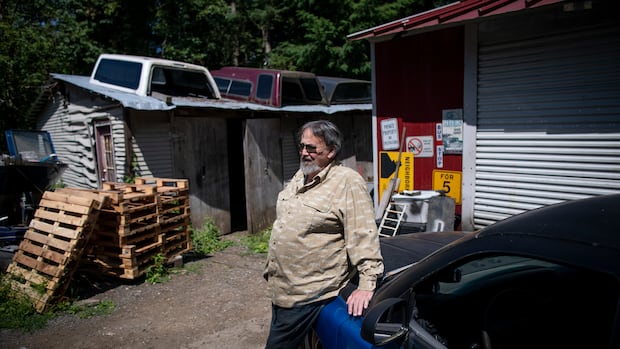When Darrell Nash sold his used SUV last spring, he thought the deal was done.
After all, the 66-year-old retired truck driver who lives near Langley, B.C., is a self-described “car guy” who says he has plenty of experience buying and selling vehicles.
A couple of months later, Nash says he was blindsided by a $1,500 towing and storage bill for a vehicle he no longer owned, thanks to what he calls a “terrifying loophole in how vehicle transfers are handled.”
“It’s a problem,” Nash told Go Public. “A very strange situation … I didn’t know what to do.”
While Nash was in hospital recovering from open heart surgery in March, his grandson, with permission, sold the family’s 2004 Acura MDX to a stranger.
It wasn’t worth much. The aging vehicle had more than 300,000 kilometres on it and mechanical issues, so they sold it for $500 cash. The buyer filled out the proper transfer forms, brought his own plates and drove away.
“Two adult people made a deal, shook, signed papers and transferred money … that should be the end of it … but it doesn’t seem to be that way,” Nash said.
About three months after the sale, the RCMP called. The vehicle had been found abandoned about 35 kilometres away, uninsured and still registered in Nash’s name.
“I got a call saying that this vehicle was in Surrey on the side of a road with no plates on it,” Nash told Go Public.
“And I said: ‘Oh, I sold that car a couple of months ago and I have the paperwork for it.’ And he goes: ‘Oh then you’re fine.'”
But he wasn’t.
A retired truck driver in B.C. was left with a $1,500 tow truck bill for a vehicle he had sold months earlier because of what a legal expert says is a gap in vehicle transfer laws that could leave almost anyone selling a vehicle at risk.
A couple of weeks after that call from police, Nash opened a letter from a towing company demanding payment. Because the buyer never registered the vehicle, legally it still belonged to Nash.
“The tow truck company just pretty much said that ‘Well, we’ll just send it to collections,’” Nash said, adding, “’and you’ll end up paying it because it’ll ruin your credit.’”
Loophole leaves sellers exposed
Experts say Nash’s situation could happen to almost anyone who sells a vehicle in most of Canada.
Scott Stanley, an automotive insurance lawyer and partner at Murphy Battista LLP in Vancouver, said Nash’s case exposes a serious gap in most provincial vehicle laws — one that leaves honest sellers on the hook for someone else’s mess.

He said the issue is simple: only buyers are required to transfer the registration at the vehicle registry office. The seller doesn’t have to be there.
So if a buyer never completes the paperwork, the seller’s name stays on the registration — and with it, the responsibility for tickets, towing, insurance or possibly criminal liability, said Stanley.
Nash is not alone. Rob Fournier, an independent vehicle examiner in Langley, B.C., says he believes a lot of people skip confirming their buyer completes the registration.
“Most people just kind of step over that step, not realizing how crucial it can be.”
Stanley said the gap puts honest people at risk as they rely on buyers to do the right thing, with no system to make sure they do.
He said the seller can be left responsible if the vehicle is involved in a crime, accident or “any sort of mischief or harm that can happen when someone has a vehicle.”
Independent vehicle inspector Rob Fournier talks about how owners can ensure they don’t get dinged selling an old car.
It’s different if you buy a car from a dealership. In British Columbia, for example, used car dealers often have someone on site who completes the transfer of the registration before the buyer drives away.
Nash learned that the hard way.
Even with proof of the sale, B.C.’s provincial insurer — the Insurance Corporation of British Columbia (ICBC) — told him he was responsible for the towing and storage charges.
He said he hasn’t been able to track down the buyer and doesn’t blame the tow company or police. He blames the system.
- Got a story you want investigated? Contact Rosa and the Go Public team at [email protected]
“They said until it has a stamp it’s not a binding contract,” Nash said.
He said even his local insurance agent was shocked.
“My Autoplan dealer was horrified,” Nash said. “She told me she’s been saying for years that once you have your seller’s copy, you’re good. But it’s not true.”
The fix
Nova Scotia and Newfoundland and Labrador are among the few provinces that have closed the loophole. Those jurisdictions have a built-in safeguard that protects vehicle sellers — a system experts say other provinces and territories could easily copy.
In most provinces, the seller fills in a paper or online form to transfer the title and then leaves the rest to the buyer — trusting the new owner will register the vehicle in their name.
Many provinces recommend the buyer and seller go together to get the transfer forms officially stamped but do not require it.
But in those places that have fixed the legal loophole, the law adds one crucial step: sellers must file the notice of sale portion of the certificate of registration and submit it to the registry of motor vehicles, listing the buyer’s name.
That simple step instantly removes the vehicle from the seller’s record, shifting the responsibility to the new owner. There’s no confusion.
“How simple is that?” Nash said. “I could totally get behind that. I’d be protected, the buyer’s protected — everyone’s covered.”
Change isn’t on the radar
Fournier says the fix could easily be implemented in other provinces, but there’s a lack of motivation to change things.
“It makes perfect sense. I think it’s a great idea,” said Fournier, who acts as a consumer advocate for people buying and selling used cars or dealing with insurance claims.
Stanley agrees, saying that small change that could prevent big headaches across the country.
“It seems to me it would be a fairly simple legislative fix. A lot of provinces have the same gap…. It would be a simple fix just to make it a mandatory transfer at the time of sale.”
In jurisdictions that have fixed the loophole, the buyer and seller are required to sign a bill of sale or a special transfer agreement and submit it to the vehicle registration — in person or online.
There is a deadline to complete this transfer — ranging from 10 to 30 days — depending on where you live.
The stress was pretty intense for a while.– Darrell Nash
Legal experts say it’s an easy fix, but the province’s CBC looked at — including B.C., Alberta, Ontario, Saskatchewan and more — are making no move to adopt it.
In a statement to CBC News, the B.C. Ministry of Transportation said it’s not considering any changes.
Stanley said that leaves too much responsibility on individual sellers.
“It doesn’t happen very often, but when it does, it is a big deal for the seller because they have remedies to fix these problems, but that involves hiring lawyers, paying lots of legal fees and often it’s easier just to sort of deal with the cost of the mischief rather than pay for [it].”

For Nash, the experience has been stressful and potentially pricey. He’s now hoping his member of the provincial legislature can help.
“The stress was pretty intense for a while,” Nash said. “It’s a nightmare because of my age, I don’t need my credit rating messed up and lawyer fees and it just doesn’t become worth it.”
While Nash may in the end get a break on his towing bills — it’s still undetermined — he’s not off the hook yet.
Until the law changes, he has a warning for Canadians selling used vehicles privately.
“The car does not leave my yard until it’s out of my name. That’s the rule now.”
Submit your story ideas
Go Public is an investigative news segment on CBC-TV, radio and the web.
We tell your stories, shed light on wrongdoing and hold the powers that be accountable.
If you have a story in the public interest, or if you’re an insider with information, contact [email protected] with your name, contact information and a brief summary. All emails are confidential until you decide to Go Public.
Read more stories by Go Public.
Read about our hosts.









